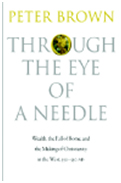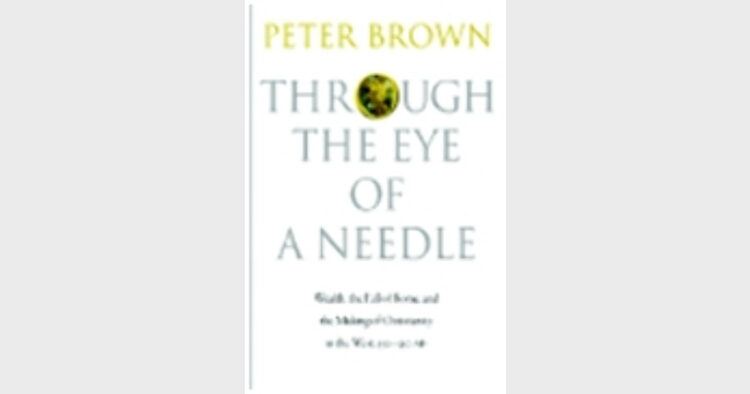Christianity and wealth generation: A study
Dr R Balashankar
 Through the Eye of a Needle: Wealth, the fall of Rome, and the Making of Christianity in the West, 350-550 AD, Peter Brown, Princeton University Press, Pp 806 (HB), $ 39.95
Through the Eye of a Needle: Wealth, the fall of Rome, and the Making of Christianity in the West, 350-550 AD, Peter Brown, Princeton University Press, Pp 806 (HB), $ 39.95
OVER the past few centuries the West, almost all of them Christian nations, has generated a huge amount of wealth. And yet, Jesus preached that for the wealthy the doors of heaven are closed. So how does the dichotomy sit? In an amazingly in-depth inquiry, Peter Brown, an antiquities scholar, goes through the history of Rome during 200 hundred years between 350 and 550 AD to lay the foundation of an answer to this.
Through the Eye of a Needle – Wealth, the fall of Rome, and the Making of Christianity in the West, 350-550 AD is an account of the emergence of the new religion of Christ, the fading Roman culture, the rise of a new class of people in terms of the hierarchy in the church, who began interpreting Christianity in ways that were convenient, contemporary and appeared correct.
Peter Brown has effectively argued that other than totally renouncing wealth, faithful and believing Christians have given away a part of their wealth to the poor and needy and that act of donation needs to be seen as living up to the ideals of the faith. “To treat renouncers of wealth as the heroes and heroines of a “true” Christianity and to view all other forms of religious giving as somehow a betrayal of the essential radicalism of the Christian movement is to merely echo the high-minded language of the ascetic movement.”
Tracing the growth of Christianity through the early centuries after Christ, Brown says, “This book has traced a long process. We began with a hesitant age. As a result of conversion of Constantine in 312 AD, the Christian churches of the West had become privileged. But they had not become wealthy. The majority of the upper-class inhabitants of the Roman West were still encouraged by long tradition to show generosity to their cities and to their fellow citizens—not to the churches and still less to the poor. Only in the last quarter of the fourth century did the wealthy enter the church in growing numbers, often stepping into leadership roles as bishops and as Christian writers. It was the entry of new wealth and talent into the churches from around the year170 onward, rather than the conversion of Constantine in 312, which marks the turning point in the Christianization of Europe. From then onward, as members of a religion that had been joined by the rich and powerful, Christians could begin to think the unthinkable—to envision the possibility of a totally Christian society.”
There is this interesting account of lighting in the churches. In the sixth century, the mosaic artists created a world where “the day remains through art.” To this, the devotees added lights, in the form of oil lamps and candles. Light was identified with Paradise and the lit churches turned into little heavens. With time, from the fourth to sixth century, the nature of donors mentioned in the mosaic outside the church also changed, with minor figures giving way to leaders of local society. Where there was ‘the teacher of children’ as a donor, now there were the names of local elite. “This shift in donors and in what they paid for is the measure of the changing of an age.”
Brown goes through the two-hundred years with the thoroughness that is amazing and at times heavy. In conclusion, he notes “Last, but not least, the greatest surprise of all occurred in the last fifth century. The leaders of the churches realized that they—and not the great lay landowners whose fortunes had previously dwarfed the wealth of the churches—were, at last, truly wealthy. The collapse of the traditional aristocracies left the church in a unique position… It was the weight of this new collective wealth, combined with the support of a new constituency of lay donors—drawn from many levels of society but most prominently from the new aristocracies of the post-imperial West—that exerted a discreet and continuous pressure on the churches of Latin Europe around 600 AD.
Peter Brown is the Philip and Beulah Rollins Professor of History Emeritus at Princeton University and has authored several books. Thoroughly researched, making use of the new materials that have emerged in the recent years, The Eye of the Needle is a scholarly work not just on early Christianity but relates its growth to the later developments and offers a new reading of the old sayings. It definitely is a source book for readers on religion and society.
(Princeton University Press, 41, William Street, Princeton, New Jersey 08540)















Comments